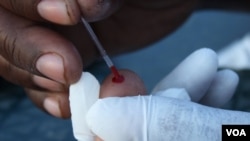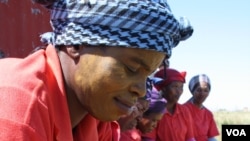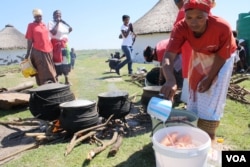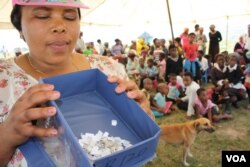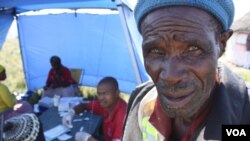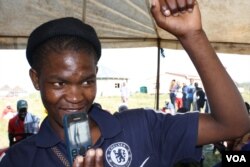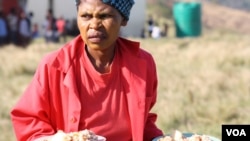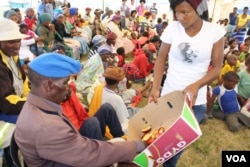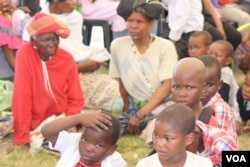BULUNGULA, SOUTH AFRICA —
This is Part Two of a five-part series Continue to Parts: 1 / 2 / 3 / 4 / 5
Women dressed in bright red overalls light roaring fires under huge cast iron pots to heat liters of sunflower oil and stock. They tear open plastic bags filled with mounds of frozen chicken pieces and pour boiling water over the pale meat to thaw it.
Scrawny dogs of long lost pedigree are threatened with sharp sticks and berated with screeches of “Voertsek!” [“Get lost!”], when the bedraggled beasts get too close to the piles of food.
In the shade offered by a tin shack that looks as if it could collapse at any moment, more women armed with blunt knives peel, scrape and cut carrots, cabbages, onions and pumpkins. They murmur disapprovingly when a young woman wearing skintight jeans and a T-shirt that strains against her chest saunters past their sweaty huddle; but they mutter approvingly when they notice it’s the face of Nelson Mandela smiling down at them from the woman’s tight-fitting top.
Soon, cauldrons of chicken, maize and vegetables are bubbling, steam rising into the powder blue sky. It’s a hot summer’s day in Bulungula district on South Africa’s southeast coast and the cooks slave over the black metal vats of simmering stew.
Hundreds of people from surrounding villages are here to enjoy the feast. The atmosphere is electric with gossip and laughter. New friendships are formed; old enemies are ignored.
It’s a celebration, a happy outpouring of community spirit – yet in the very recent past the people of the surrounding four villages associated this occasion not with the joy of life…but with fear, pain and even death. They were so terrified of it, in fact, that most boycotted it.
Colleague’s death leads to commitment
Every month, a local nonprofit organization called the Bulungula Incubator [BI] would set up a tent near one of the villages in the traditional heartland of the country’s Xhosa ethnic group.
In this part of South Africa’s Eastern Cape province, according to the state health department, about one in four people aged between 15 and 49 has HIV. Desperate to slow the rate of infection, the BI would invite local residents to be tested for the virus by nurses and counselors in its tent.
But, other than a few curious old people, no one turned up. Few in the impoverished region wanted to know their HIV status. Those who found out that they were infected, during medical check-ups at the nearest hospital, kept it secret. The virus remains highly stigmatized in the Bulungula area; those known to be HIV-positive are often shunned – despite the disease’s high prevalence.
And so HIV continued to spread here, courtesy of a toxic cocktail of irresponsible sexual behavior and willful ignorance. Illness and death reigned.
One of the casualties was a 24-year-old BI employee.
“She was a lovely, healthy, vibrant person. It was very, very hard for us because she contracted HIV and then she just gave up. She lost weight rapidly. Within three months…she looked like a skeleton,” said Rejane Woodroffe, the organization’s director.
“Everybody sat around and basically begged her to take her ARVs [life-prolonging antiretroviral medication]…and she just refused. Then she engaged in some traditional [healing] ceremonies after which she got even more ill. And we slowly watched her die.”
Their colleague’s terrible death had a profound effect on everyone at the NGO. But, out of the loss and the agony sprang a commitment from the health workers that they would do all they could to prevent others in the community from suffering the same fate.
‘Cherry on top’
“We decided we had to do something really radical to get the attention of the community and to get as many people as possible tested for HIV, so that they could get onto treatment and so that we could educate them about the best ways not to infect other people,” explained Nomzingisi Hopisi, health manager at the BI.
“We saw how fear of discrimination made our colleague refuse to disclose her status and we were determined that this should not happen to other people here. Now we are trying by all means to make them disclose [their HIV-positive status]. When you are keeping it secret, it consumes your life,” she said.
“But the more you talk about it, the more normal your condition becomes and so the more you accept it and then you become willing to take the steps necessary to prolong your life.”
“We really ramped up our testing efforts after our colleague’s death. Everything we do now is geared towards saving lives, because of the experience we went through with our colleague,” said Woodroffe.
The BI decided to transform testing days from somber, serious events into fun occasions that would attract the residents of Bulungula instead of repelling them.
“We just started thinking of gimmicky things and novelty factors that would draw people. So we just got big speakers and played some great music and we cooked a nice lunch,” Woodroffe told VOA.
The BI also filled attractively sewn “goodie bags” with toiletries, condoms and other goods. People who agreed to be tested for HIV were given the bags.
But the “cherry on top,” as Hopisi put it, and the BI’s main strategy to get more people in the area to test for HIV, was a cellphone raffle to be held on each testing day.
“People here love cellphones. This is an area that’s so isolated that a cellphone is most peoples only link with the outside world. But most people here are too poor to afford even the cheapest phone,” said Hopisi.
High demand for tests
There’s a blue hue clouding the balmy interior of the tent that’s pitched on the rocky field. People form a long queue snaking away from the structure as they wait to be tested for HIV. Some tote large beach umbrellas as shelter from the fiery sun.
The manager of the test center, Sityhilelo Mandlingana, smiled as he surveyed the scene. He became mildly exasperated with two elderly men who were demanding that he test them. “We tested you two gentlemen just a few weeks ago; we can’t test you again now!” Mandlingana barked at the insistent old men, who muttered in annoyance as they hobbled away from the tent.
Mandlingana laughed and said, “They’re so old I doubt whether they are still capable of sex! Yet they are turning up here for HIV testing! They just want to win the cellphone!”
He continued, “Can you believe it? We are now turning people away from being tested!”
Just a few months ago, less than 10 people arrived at Mandlingana’s door to undergo HIV tests. “Now we have tested 91 today,” he beamed.
Inside the canvas enclosure, nurse Nokwezi Dishi gazed firmly into a young man’s face, struggling to meet his eyes, which were hidden behind a floppy khaki hat. Her features softened as she grasped his hand, blood still seeping slowly from the prick in his finger. The man had just tested positive for HIV.
He seemed shocked into silence. But Dishi told him, “Be calm. It’s not a death sentence; it’s not the end of your life; it’s just a new beginning.” She explained to him that he would now have to take ARVs, and she made an appointment for him at the local Madwaleni Hospital – “for counseling and a medical examination” and to collect his first supply of drugs.
“Hopefully, after the counseling, he will be educated enough to keep himself alive and he will not infect any other people,” said Dishi.
Lots of infections
Halfway through the day, three people out of 41 had tested positive for HIV. “That’s actually quite a low number,” Mandlingana commented. “Sometimes we can get about 10 positive…. That’s out of every 40 people tested.”
He explained, “There are a lot of people who test positive in places like this because there are no clinics here where they can get tested and so how can they know their status?”
Mandlingana said it’s the lure of a hearty meal, free goods such as toothbrushes and toothpaste and especially the chance to win a cellphone that’s now attracting great crowds of people to his HIV testing facility.
“This lucky draw event is helping us to prevent many new infections and resulting in many people going onto treatment and so saving a lot of lives,” he added.
Most of the people waiting patiently to be tested agreed that it was the possibility of winning the cellphone that had motivated them to find out their HIV status.
A community worker asked one of them, a young man named Thandisa
Sinyoko, “What is more important – knowing your status or winning the cellphone?”
Sinyoko replied, “It’s the phone, that’s by far the most important thing for me!”
Another woman in her early 20s said, “I want to win the phone but I would come even if there was no phone because I want to know if I have HIV.”
But later she acknowledged, “If I am honest, then the main attraction for me is not to know whether I am HIV-positive or not…. I want to take a chance and [hopefully] win that phone.…”
Positive results
Inside a massive big top tent filled with people chomping on chunks of chicken, the excitement was palpable as BI workers prepared to reach into a cardboard box and draw one of the names written on tiny pieces of paper.
When one of the organizers announced a name via a loudhailer, a great cheer erupted and a young man clad in a navy blue football shirt sprang to his feet to claim the cellphone. His white teeth shone in the sunlight as a permanent smile creased his face.
“I’m really, really happy to have won the cellphone,” he said. “I was not expecting to win. But knowing that I could maybe win the phone – yes, it was something extra that really made me feel like this is an occasion I should not miss and that I should get tested here today.”
For Sam Partington, an American medical student who’s a volunteer health worker at Bulungula, offering people incentives such as the possibility of winning a cellphone is a new approach in the struggle to minimize HIV infections.
“I’ve worked on various projects around the world and I haven’t seen it being done elsewhere,” he said. “But the positive results that it causes have been wonderful to witness. It gives people more of a reason to go to the events. It gets rid of the stigma [associated with HIV testing]. People can say, ‘Well, I’m just going [to the event] to try to win a cellphone.’ They don’t have to say, ‘Well, I’m going because I think I may have HIV.’”
Ethics of incentives
But for some in South Africa – most notably certain politicians and academics – offering people food and other free gifts in exchange for them being tested for HIV is wrong.
When Helen Zille, the leader of South Africa’s Democratic Alliance party, last year offered cash prizes to people who got tested in the Western Cape province, the ruling African National Congress criticized her strategy as “unethical” and “irresponsible.”
But the BI’s Nomzingisi Hopisi argued, “This is the country in the world with the most people living with HIV [5.6 million people, according to the United Nations] so we need to get radical in terms of how we decrease the spread of HIV…. People who criticize incentives should just get real.”
Her colleague, Rejane Woodroffe, was even blunter, saying, “I understand philosophical, ethical debates but I think that in terms of our situation, I don’t think it’s appropriate or relevant.”
The estimate that one in four adults in the Bulungula district is infected with HIV spurred Partington to comment: “Excuse the cliché but desperate times call for desperate measures and HIV is an extraordinary disease and so extraordinary measures must be taken against it. I don’t see the negative side to the incentives. I don’t see how encouraging people to test, regardless of how you encourage them to test, can ever be a bad thing – because it is ultimately saving many lives.”
Even state health workers acknowledge that government testing programs in some areas, such as Bulungula, aren’t adequate. “We are not testing as many people as we should. The people simply don’t come to us. So when a project like this comes along we must support it and not criticize it,” said one.
“Our testing incentives have changed attitudes to HIV here and are resulting in better management of the disease,” said Woodroffe. “So I don’t see any harm in providing these incentives. I see lots of harm when there aren’t any incentives and people die.”
This is Part Two of a five-part series Continue to Parts: 1 / 2 / 3 / 4 / 5
Women dressed in bright red overalls light roaring fires under huge cast iron pots to heat liters of sunflower oil and stock. They tear open plastic bags filled with mounds of frozen chicken pieces and pour boiling water over the pale meat to thaw it.
Scrawny dogs of long lost pedigree are threatened with sharp sticks and berated with screeches of “Voertsek!” [“Get lost!”], when the bedraggled beasts get too close to the piles of food.
In the shade offered by a tin shack that looks as if it could collapse at any moment, more women armed with blunt knives peel, scrape and cut carrots, cabbages, onions and pumpkins. They murmur disapprovingly when a young woman wearing skintight jeans and a T-shirt that strains against her chest saunters past their sweaty huddle; but they mutter approvingly when they notice it’s the face of Nelson Mandela smiling down at them from the woman’s tight-fitting top.
Soon, cauldrons of chicken, maize and vegetables are bubbling, steam rising into the powder blue sky. It’s a hot summer’s day in Bulungula district on South Africa’s southeast coast and the cooks slave over the black metal vats of simmering stew.
Hundreds of people from surrounding villages are here to enjoy the feast. The atmosphere is electric with gossip and laughter. New friendships are formed; old enemies are ignored.
It’s a celebration, a happy outpouring of community spirit – yet in the very recent past the people of the surrounding four villages associated this occasion not with the joy of life…but with fear, pain and even death. They were so terrified of it, in fact, that most boycotted it.
Colleague’s death leads to commitment
Every month, a local nonprofit organization called the Bulungula Incubator [BI] would set up a tent near one of the villages in the traditional heartland of the country’s Xhosa ethnic group.
In this part of South Africa’s Eastern Cape province, according to the state health department, about one in four people aged between 15 and 49 has HIV. Desperate to slow the rate of infection, the BI would invite local residents to be tested for the virus by nurses and counselors in its tent.
But, other than a few curious old people, no one turned up. Few in the impoverished region wanted to know their HIV status. Those who found out that they were infected, during medical check-ups at the nearest hospital, kept it secret. The virus remains highly stigmatized in the Bulungula area; those known to be HIV-positive are often shunned – despite the disease’s high prevalence.
And so HIV continued to spread here, courtesy of a toxic cocktail of irresponsible sexual behavior and willful ignorance. Illness and death reigned.
One of the casualties was a 24-year-old BI employee.
“She was a lovely, healthy, vibrant person. It was very, very hard for us because she contracted HIV and then she just gave up. She lost weight rapidly. Within three months…she looked like a skeleton,” said Rejane Woodroffe, the organization’s director.
“Everybody sat around and basically begged her to take her ARVs [life-prolonging antiretroviral medication]…and she just refused. Then she engaged in some traditional [healing] ceremonies after which she got even more ill. And we slowly watched her die.”
Their colleague’s terrible death had a profound effect on everyone at the NGO. But, out of the loss and the agony sprang a commitment from the health workers that they would do all they could to prevent others in the community from suffering the same fate.
‘Cherry on top’
“We decided we had to do something really radical to get the attention of the community and to get as many people as possible tested for HIV, so that they could get onto treatment and so that we could educate them about the best ways not to infect other people,” explained Nomzingisi Hopisi, health manager at the BI.
“We saw how fear of discrimination made our colleague refuse to disclose her status and we were determined that this should not happen to other people here. Now we are trying by all means to make them disclose [their HIV-positive status]. When you are keeping it secret, it consumes your life,” she said.
“But the more you talk about it, the more normal your condition becomes and so the more you accept it and then you become willing to take the steps necessary to prolong your life.”
“We really ramped up our testing efforts after our colleague’s death. Everything we do now is geared towards saving lives, because of the experience we went through with our colleague,” said Woodroffe.
The BI decided to transform testing days from somber, serious events into fun occasions that would attract the residents of Bulungula instead of repelling them.
“We just started thinking of gimmicky things and novelty factors that would draw people. So we just got big speakers and played some great music and we cooked a nice lunch,” Woodroffe told VOA.
The BI also filled attractively sewn “goodie bags” with toiletries, condoms and other goods. People who agreed to be tested for HIV were given the bags.
But the “cherry on top,” as Hopisi put it, and the BI’s main strategy to get more people in the area to test for HIV, was a cellphone raffle to be held on each testing day.
“People here love cellphones. This is an area that’s so isolated that a cellphone is most peoples only link with the outside world. But most people here are too poor to afford even the cheapest phone,” said Hopisi.
High demand for tests
There’s a blue hue clouding the balmy interior of the tent that’s pitched on the rocky field. People form a long queue snaking away from the structure as they wait to be tested for HIV. Some tote large beach umbrellas as shelter from the fiery sun.
The manager of the test center, Sityhilelo Mandlingana, smiled as he surveyed the scene. He became mildly exasperated with two elderly men who were demanding that he test them. “We tested you two gentlemen just a few weeks ago; we can’t test you again now!” Mandlingana barked at the insistent old men, who muttered in annoyance as they hobbled away from the tent.
Mandlingana laughed and said, “They’re so old I doubt whether they are still capable of sex! Yet they are turning up here for HIV testing! They just want to win the cellphone!”
He continued, “Can you believe it? We are now turning people away from being tested!”
Just a few months ago, less than 10 people arrived at Mandlingana’s door to undergo HIV tests. “Now we have tested 91 today,” he beamed.
Inside the canvas enclosure, nurse Nokwezi Dishi gazed firmly into a young man’s face, struggling to meet his eyes, which were hidden behind a floppy khaki hat. Her features softened as she grasped his hand, blood still seeping slowly from the prick in his finger. The man had just tested positive for HIV.
He seemed shocked into silence. But Dishi told him, “Be calm. It’s not a death sentence; it’s not the end of your life; it’s just a new beginning.” She explained to him that he would now have to take ARVs, and she made an appointment for him at the local Madwaleni Hospital – “for counseling and a medical examination” and to collect his first supply of drugs.
“Hopefully, after the counseling, he will be educated enough to keep himself alive and he will not infect any other people,” said Dishi.
Lots of infections
Halfway through the day, three people out of 41 had tested positive for HIV. “That’s actually quite a low number,” Mandlingana commented. “Sometimes we can get about 10 positive…. That’s out of every 40 people tested.”
He explained, “There are a lot of people who test positive in places like this because there are no clinics here where they can get tested and so how can they know their status?”
Mandlingana said it’s the lure of a hearty meal, free goods such as toothbrushes and toothpaste and especially the chance to win a cellphone that’s now attracting great crowds of people to his HIV testing facility.
“This lucky draw event is helping us to prevent many new infections and resulting in many people going onto treatment and so saving a lot of lives,” he added.
Most of the people waiting patiently to be tested agreed that it was the possibility of winning the cellphone that had motivated them to find out their HIV status.
A community worker asked one of them, a young man named Thandisa
Sinyoko, “What is more important – knowing your status or winning the cellphone?”
Sinyoko replied, “It’s the phone, that’s by far the most important thing for me!”
Another woman in her early 20s said, “I want to win the phone but I would come even if there was no phone because I want to know if I have HIV.”
But later she acknowledged, “If I am honest, then the main attraction for me is not to know whether I am HIV-positive or not…. I want to take a chance and [hopefully] win that phone.…”
Positive results
Inside a massive big top tent filled with people chomping on chunks of chicken, the excitement was palpable as BI workers prepared to reach into a cardboard box and draw one of the names written on tiny pieces of paper.
When one of the organizers announced a name via a loudhailer, a great cheer erupted and a young man clad in a navy blue football shirt sprang to his feet to claim the cellphone. His white teeth shone in the sunlight as a permanent smile creased his face.
“I’m really, really happy to have won the cellphone,” he said. “I was not expecting to win. But knowing that I could maybe win the phone – yes, it was something extra that really made me feel like this is an occasion I should not miss and that I should get tested here today.”
For Sam Partington, an American medical student who’s a volunteer health worker at Bulungula, offering people incentives such as the possibility of winning a cellphone is a new approach in the struggle to minimize HIV infections.
“I’ve worked on various projects around the world and I haven’t seen it being done elsewhere,” he said. “But the positive results that it causes have been wonderful to witness. It gives people more of a reason to go to the events. It gets rid of the stigma [associated with HIV testing]. People can say, ‘Well, I’m just going [to the event] to try to win a cellphone.’ They don’t have to say, ‘Well, I’m going because I think I may have HIV.’”
Ethics of incentives
But for some in South Africa – most notably certain politicians and academics – offering people food and other free gifts in exchange for them being tested for HIV is wrong.
When Helen Zille, the leader of South Africa’s Democratic Alliance party, last year offered cash prizes to people who got tested in the Western Cape province, the ruling African National Congress criticized her strategy as “unethical” and “irresponsible.”
But the BI’s Nomzingisi Hopisi argued, “This is the country in the world with the most people living with HIV [5.6 million people, according to the United Nations] so we need to get radical in terms of how we decrease the spread of HIV…. People who criticize incentives should just get real.”
Her colleague, Rejane Woodroffe, was even blunter, saying, “I understand philosophical, ethical debates but I think that in terms of our situation, I don’t think it’s appropriate or relevant.”
The estimate that one in four adults in the Bulungula district is infected with HIV spurred Partington to comment: “Excuse the cliché but desperate times call for desperate measures and HIV is an extraordinary disease and so extraordinary measures must be taken against it. I don’t see the negative side to the incentives. I don’t see how encouraging people to test, regardless of how you encourage them to test, can ever be a bad thing – because it is ultimately saving many lives.”
Even state health workers acknowledge that government testing programs in some areas, such as Bulungula, aren’t adequate. “We are not testing as many people as we should. The people simply don’t come to us. So when a project like this comes along we must support it and not criticize it,” said one.
“Our testing incentives have changed attitudes to HIV here and are resulting in better management of the disease,” said Woodroffe. “So I don’t see any harm in providing these incentives. I see lots of harm when there aren’t any incentives and people die.”




